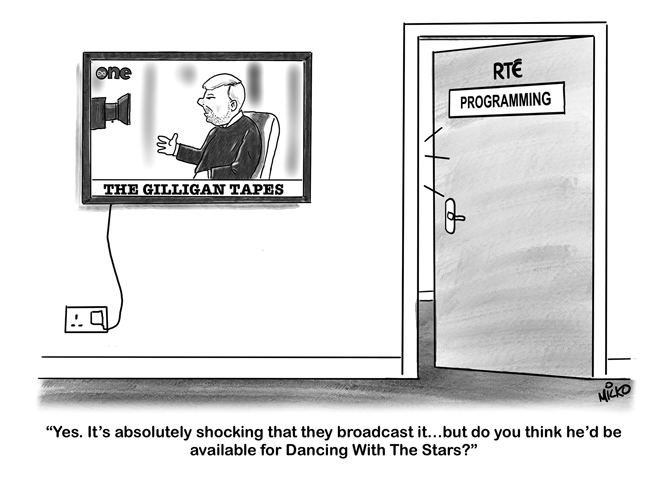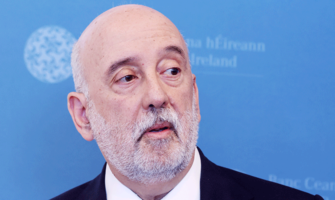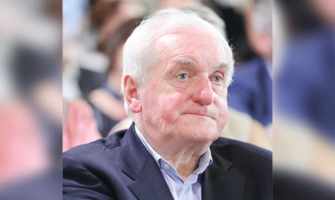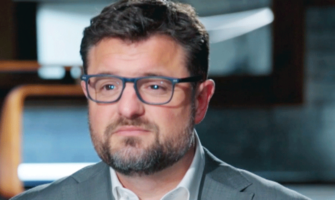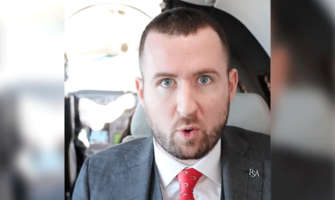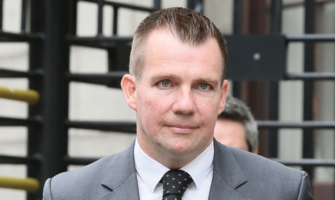
Fintan O'Toole
HAS THE Old Lady of Tara Street finally realised that John Redmond-type calls to defend poor little Ukraine are really an effort to involve Ireland in that big battle between the beasts of East and West, Nato and the Brics? Worse, it looks as though the West’s military strategy in Ukraine is unravelling and the two shrillest, pro-war voices among the more dutiful Irish – Micheál Martin and the Irish Times (IT) – may be stranded on the wrong side of history (not for the first time in the latter’s case).
The Tánaiste is locked into high-level EU career stakes and is unlikely to revise his revisionism any time soon but the IT appears to be undergoing a rethink and, ironically, it has been sparked by Martin.
IT crime and security correspondent Conor Gallagher has a strong editorial appetite for matters military but the indignation in his reports last month on the deliberately delayed news that Irish troops were to provide weapons training to Ukrainian soldiers was clear to most. He pointed out that this type of military assistance was not included in the Government’s earlier announcement, that it contradicted Martin’s assurance that such training would be in “non-lethal” areas, and that the Government position to date had been not to provide Ukraine with offensive military support “in line with Ireland’s military neutrality and the programme for government”. This is not IT-type language in these matters.
Next day Gallagher and Cormac McQuinn reported TD Paul Murphy’s attack on the Government for breaching neutrality and also that of Green TD Neasa Hourigan, as well as the rash of contradictory statements from Government. For example, the initial Government statement that did not include lethal arms training was, it said, “always intended to be indicative rather than exhaustive”. That position had now changed to one claiming that arms training had only been added later on.
IT editorials are often abstruse but editor Ruadhán Mac Cormaic told readers in this period that the Government’s training of de-mining was vital to enabling Ukraine’s “mass attacks” (clearly lethal and offensive). He also said that the “training in basic lethal military skills such as rifle use” was something that could be described as defensive – or at least this is what “the Government argues”. Until very recently the IT would not have qualified the argument thus.
Days later came the withering, sarcastic opinion of political editor Pat Leahy, no secret People Before Profit sympathiser, who warned readers to expect further debate about neutrality after his newspaper’s reports about Irish troops training Ukrainians.
This, Leahy warned, “is in apparent conflict with all the assurances from Government that Ireland’s assistance to the embattled country is strictly non-lethal. It is possible, I suppose, that the Ukrainians are being trained to use the weapons in a non-lethal fashion, though that would rather defeat the purpose. The issue will certainly be raised in the Dáil, to the discomfort of at least some Green TDs, and many members.”
It was left to the ultimate IT arbiter in matters of ethics and politics, Fintan O’Toole, to deliver a comprehensive summary of the difficult situation Irish liberals find themselves in after 18 months of war-mongering rhetoric. Fintan rose to the occasion and in earnest, hand-wringing tones the most adult member in the IT editorial room told readers and his charges that Russia and that monster Putin would not be defeated or unseated, the West would not sustain an endless war in the region, Ukraine would not be able to reclaim all of its territory and it would have to settle with Moscow on compromised war aims.
It may be that the IT is still weighing up the situation and is aware that not all EU states are still enthusiastic about Ukraine war. And it is likely that senior editorial staff realise Martin’s debate on international security was a self-defeating exercise. It may also be that a backlash from certain quarters will haul Mac Cormaic and his team back into line. But one way or another, the debate has started.
